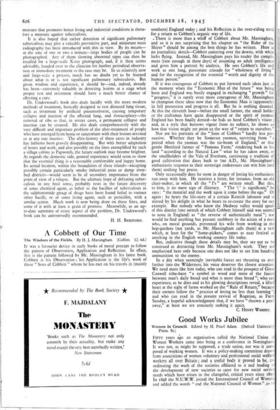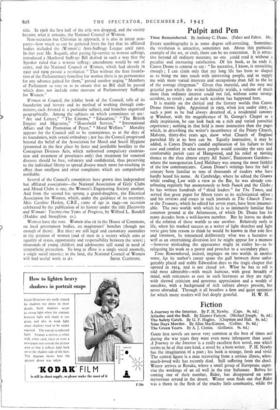Good Works Jubilee
FiFry years ago an organisatkm called the National Union Women Workers came into being at a conference in Nottingham. It was not, as might be supposed, a trade union, nor was it com- posed of working women. It was a policy-making committee drawn from associations of women voluntary and professional social welfare workers all over Britain - and a useful body it proved to be, co- ordinating the work of the societies affiliated to it and leading r) the development of new societies to cater for new social servic.; needs which have arisen in the changeful, critical years since x895 In 5898 the N.U.W.W. joined the International Council of Women, and added the words " and the National Council of Women " to
tide. In 1918 the first half of the title was dropped, and the society became, what it remains, the National Council of Women.
Non-sectarian but Christian in approach, it is also in intent non- party—how much so can be gathered from the fact that its affiliated bodies included the (Women's) Anti-Suffrage League until 1912. In that year Mr. Asquith, after paving lip-service to woman suffrage, introduced a Manhood Suffrage Bill drafted in such a way that the Speaker ruled that a woman suffrage amendment would be out of order, and the National Council of Women, which had already in 1902 and 1909 passed a resolution " That without the firm founda- tion of the Parliamentary franchise for women there is no permanence for any advance gained for them," passed another urging "Members of Parliament to vote so as to ensure that no Bill shall be passed which does not include some measure of Parliamentary Suffrage for Women."
Women in Council, the jubilee book of the Council, tells of its foundation and history and its method of working through com- mittees, each devoted tc a particular subject, and branches organised geographically. Among the subjects on which committees sit are: " Art and Letters," " The Cinema," " Education," " The British Empire and Migration," " Household Service," " International Affairs and the Promotion of Peace," " Moral Welfare." Morality appears for the Council still to be synonymous, as in the days of its foundation, with sexual orthodoxy ; nor has the Council progressed beyond the belief of the Association for Moral and Social Hygiene (promoted in the first place by fierce and justifiable hostility to the Contagious Diseases Acts, which authorised compulsory examina- tion and treatment of prostitutes only) that treatment for venereal diseases should be free, voluntary and confidential, thus preserving to the individual liberty to spread disease much more far-reaching in effect than smallpox and other complaints which are compulsorily notifiable.
Several of the Council's committees have grown into independent but affiliated associations—the National Association of Girls' Clubs and Mixed Clubs is one, the Women's Engineering Society another. And from the second has sprung a grand-daughter, the Electrical Association for Women, which, undet the guidance of its secretary. Miss Caroline Haslett, C.B.E., came of age in 1945—an occasion celebrated by the publication of its history under the title Electricity and Woman: Twenty-one Years of Progress, by Wilfred L. Randell (Hodder and Stoughton, 5s.).
Women have the vote. Women also sit in the House of Commons, on local government bodies, on magistrates' benches (though not enough of them). But there are still legal and customary anomalies in the position of women (and of men in a society which aims at equality of status, opportunity and responsibility between the sexes) - thousands of young children and adolescents still stand in need of sympathetic protection. So long as tliere is a single social anomaly, a single social injusticz in the land, the National Council of Women































 Previous page
Previous page